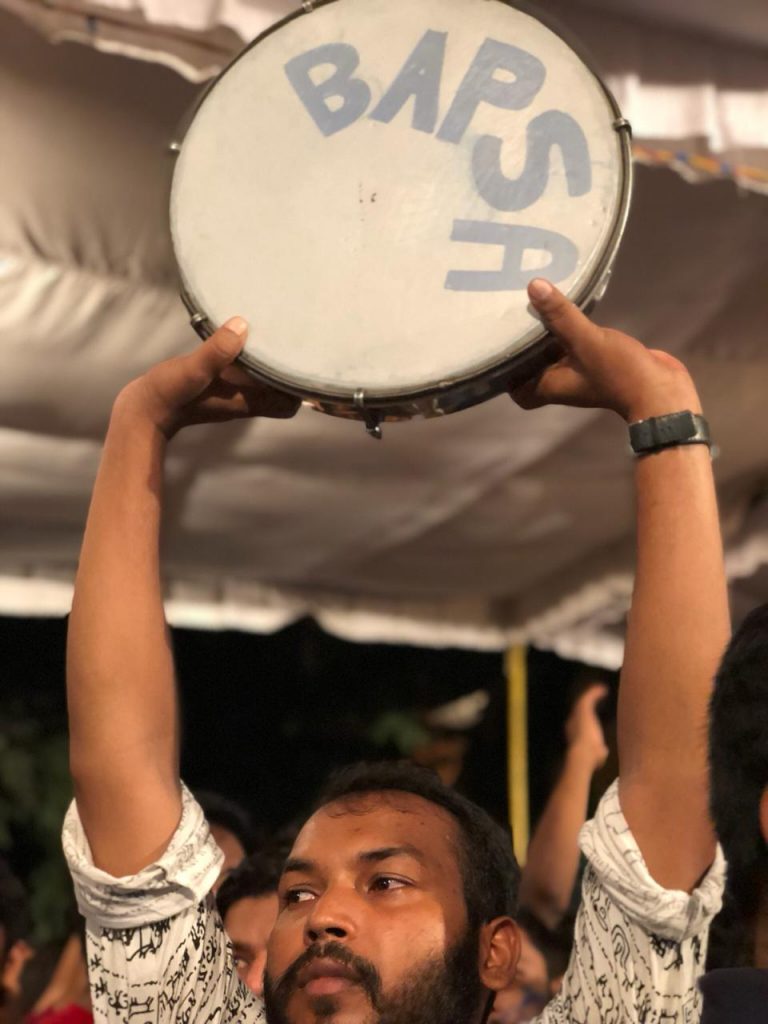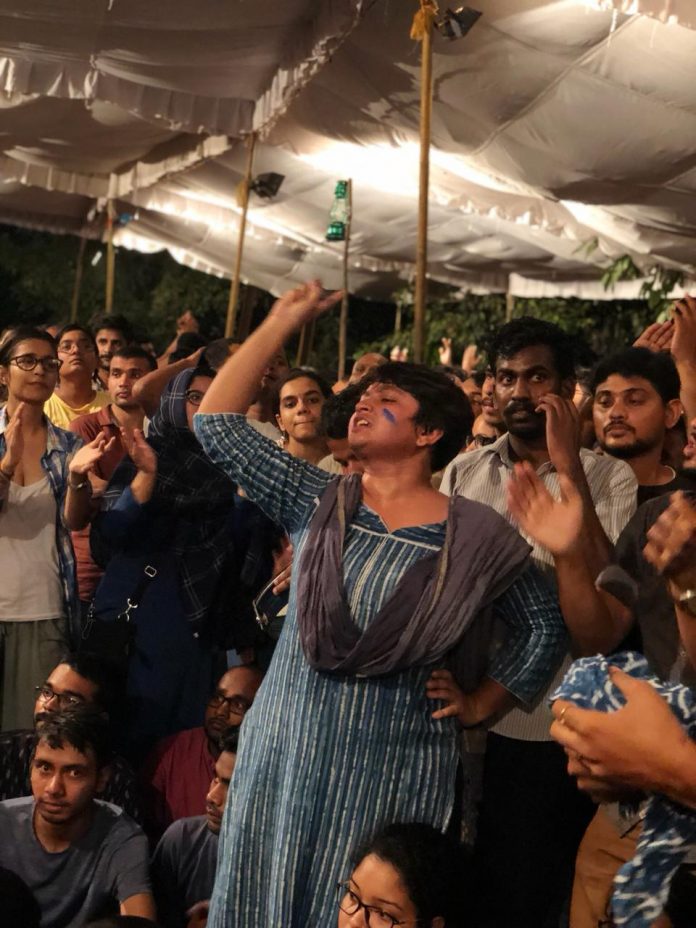In two days time, students will be voting for representatives in the university-wide student union elections in Jawaharlal Nehru University, Delhi. Like the past few years, students from BAPSA (Birsa Phule Ambedkar Students’ Association) will contest for key positions. All of them are now wrapping up the final stages of their campaigns.
Thallapelli Praveen running for President, Purnachandra Naik for Vice President, Vishwambhar Nath for General Secretary and Kanaklata Yadav for Joint Secretary, all hail from marginalised communities. Several other BAPSA candidates are also running for Councilors of the various schools within the university.
BAPSA’s ideals envision a ‘unity of the oppressed’. One that seeks to unite an SC/ST/OBC student population with students from Muslim and other religious minority backgrounds. BAPSA has also grown steadily and rapidly in the four years since it was founded in 2014.
BAPSA’s offer of space for identity, religious beliefs and politics for oppressed people by oppressed people has seemingly proven a strong message.
An indicator of how strong BAPSA has grown is visible in the reaction from the Left Parties, who formed a coalition of the “United Left”. This unity is recent especially as the history of JNU’s Left politics was the history of animosity between Students Federation of India (SFI) and the All India Students’ Association (AISA). This new coalition Left is now campaigning against BAPSA and other campus student groups.
Sri Raman S, BAPSA candidate running for Councilor for School of Language, Literature, and Culture Studies commented on this development. “The Marginalised community has already lost 35 years but promises made to SC, ST and OBC community remain unfulfilled. It is important to remember that Left Unity was not formed due to a want to address student issues; it was an opportunistic unity. They have been pointing out ABVP as the threat for the past three years and continue to use the same agenda. This is not enough though. It doesn’t address our problems.”
TCN spoke to a few national leaders to understand what BAPSA meant to them and their vision for the communities overall. Here are the excerpts:
This whole nation has Dalits and other oppressed people struggling for different things in different places. To me, it feels like BAPSA is representing us all on a national stage in some way. For these students from Dalit, Adivasi, OBC and Muslim communities to take charge and run this organization and compete in this way is a really really big deal. The way BAPSA has grown in just four years is really historical. The most important thing is that it is run and represented by the oppressed themselves. No one is speaking for us but us. -Manisha Mashaal, Dalit feminist leader, Swabhimaan Society, Haryana
There are many movements all over the country for different issues, be it women, queer, trans, Adivasi, Muslims or others, but student organisations like BAPSA offer students from marginalized communities to experience what larger political action and strategies for the nation can look like and that makes me glad. BAPSA is showing that student politics can drag down whole power structures and change it around. I also see that BAPSA is using the slogan Satrangi Salaam from this year. I think this is good and I welcome this acceptance. Until now there haven’t been platforms where trans and queer people can belong with equity, not equality. This is important and I really hope to see more trans people in BAPSA in the coming years. Grace Banu, Dalit transgender rights activist, Trans Rights Now Collective
Students movements are like a thermometer for how the national movements are performing and by the performance of BAPSA, I can say that I am starting to have a lot more hope and positivity for our people overall. I want to mention in particular, the issue around the UGC recommendations and policies that have effectively led to reservation abolishment and trying to wash out the scholarships for students from marginalized communities. BAPSA has been one of the most vocal groups against these constitutional violations. In fact, courageous protests from these students against these policies resulted in the suspension of nine BAPSA students and their suspensions have not been revoked yet. We all know why these policies are being initiated and why the penalties for protesting against them are so high. Its a near-impossible dream for poor Bahujan students to get admission to prestigious universities like JNU and when they do get in, they see what is happening there and feel enraged and they want a change. This leads to influential student agitations and administrations and governments feel pressure. Changing the entry requirements for Bahujan students is cutting off the assertion at the bud. To me, BAPSA represents one of the most ideologically sound and most promising Bahujan movements in the nation and I want to appeal to everyone in our community – those who are educated – who are in jobs – to channel resources and support into BAPSA for our young leaders to take Babaheb’s dream forward.
Gowthama Meena, Dalit feminist, Founder, All-India Intellectual Property Scheduled Castes Employee Association
As one of the founding members of BAPSA, who has been there since Day 1 and now also as an independent activist with my own organisation, what I know to be true is that establishing BAPSA was a milestone in Phule-Ambedkarite student movement history. Seeing how BAPSA has grown makes me hopeful. When we started, we were few in number, we had almost only representatives from each of these oppressed communities – Dalit, Adivasi, Muslim and so on but now what I can see is that students at BAPSA are not just representatives, they are members, they are leaders, they are their en masse. All of this BAPSA has achieved not just through political representation. It has achieved it through everyday work of earning trust and faith in the ideology from students. Energy built in campuses inspire student movements elsewhere and inspires our youth from marginalized communities to want to be a part of a new vision for this nation.
BAPSA candidate for Councillor Deeksha Rahul is hopeful for the election. “Contesting for the post is important for claiming our spaces in politics which is very much needed to break the authoritative hegemony of certain community people and to access our right in democratic politics. And I believe BAPSA will do that well in the upcoming elections. “
BAPSA now faces a tough challenge ahead of them for the upcoming election tomorrow but the real win for them has been in the way they have established growth and inclusion and inspired and set a tone for national Ambedkarite movements.



